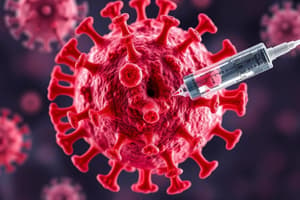Podcast
Questions and Answers
What is the primary purpose of a vaccine?
What is the primary purpose of a vaccine?
- To provide active acquired immunity to a specific disease (correct)
- To eliminate all microorganisms from the body
- To generate symptoms of diseases for study
- To strengthen the body against non-infectious diseases
Which component of a vaccine may resemble the disease-causing microorganism?
Which component of a vaccine may resemble the disease-causing microorganism?
- Weakened or killed forms of the microorganism (correct)
- Only the toxins produced by the microbe
- All DNA and RNA from the microbe
- The immune cells from the patient
Which type of immune cells are primarily responsible for eliminating pathogen-infected cells?
Which type of immune cells are primarily responsible for eliminating pathogen-infected cells?
- Natural killer cells
- Helper T-cells
- Cytotoxic T-cells (correct)
- B-cells
What is a significant outcome of vaccination in individuals?
What is a significant outcome of vaccination in individuals?
Which of the following is NOT a component involved in the process of vaccination?
Which of the following is NOT a component involved in the process of vaccination?
Flashcards are hidden until you start studying
Study Notes
What is a Vaccine?
- A biological preparation that provides active acquired immunity to a particular infectious disease.
- Contains an agent resembling a weakened or killed form of the pathogen.
- Agents can be:
- Toxins produced by the microbe
- Surface proteins of the microbe
- Nucleic acid of the microbe coding for toxins or surface proteins
How Vaccines Work
- The agent stimulates the body's immune system.
- Immune system recognizes the agent as a threat.
- Immune system destroys the agent and develops the ability to recognize and destroy future encounters of the same microorganisms.
Immune Response:
- Infections can trigger inflammatory responses.
- White blood cells are recruited to the site of infection.
- Cytotoxic T-cells eliminate pathogen-infected cells.
- B-cells neutralize circulating viruses.
Vaccination
- Stimulates an immune response against infectious microorganisms.
- Provides protection against future infections.
- Targets viruses, bacteria, and toxins.
Vaccination Outcomes
- Develops long-term protective immune memory.
- Prevents future infections.
Studying That Suits You
Use AI to generate personalized quizzes and flashcards to suit your learning preferences.





